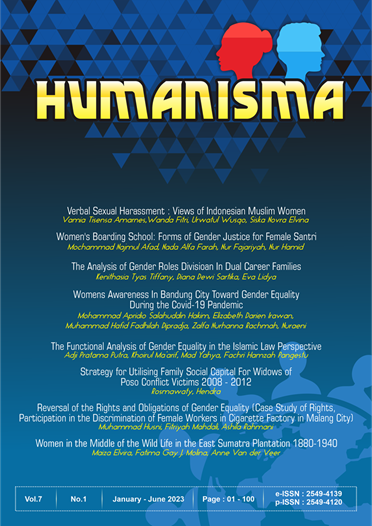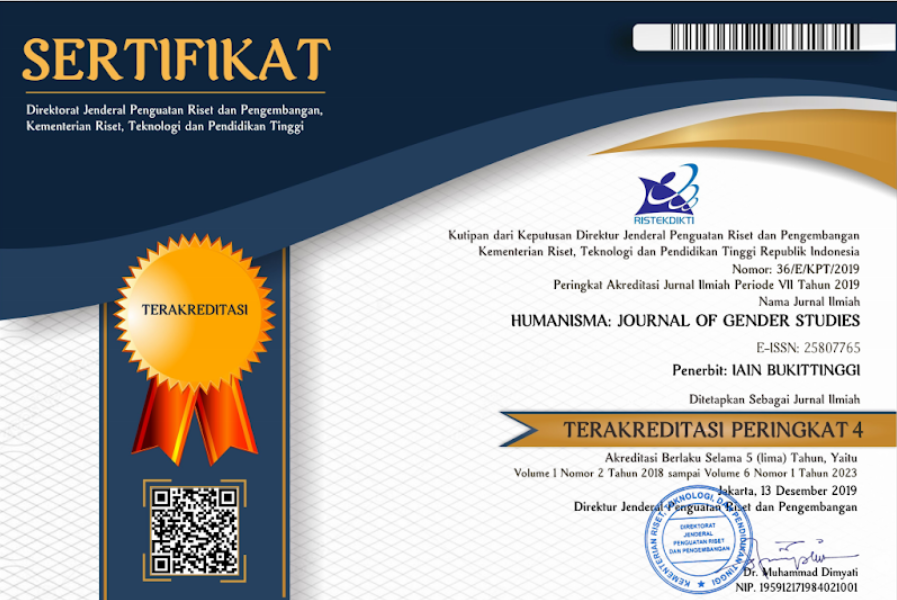The Functional Analysis of Gender Equality in the Islamic Law Perspective
DOI:
https://doi.org/10.30983/humanisme.v7i1.6223Keywords:
Gender, Equality, Islamic law,Abstract
The causative factors of the gender equality problem include misunderstanding social roles between men and women as a result of an incomplete understanding of Islamic law. This misunderstanding of gender equality results in unequal conceptions placing the positions of men and women in society.This article aims to the primary data sources in this article are the Qur'an text which outlines the gender equality issues in the Islamic law perspective. This article is a qualitative study with a normative juridical approach by describing and analyzing the concept of gender in the Qur'an and fiqh. The results of this study explain that Islam teaches equality between humans, both men and women. At least there are five principles of gender equality in Islam, men and women are both servants of Allah Swt, men and women are both caliphs of Allah, men and women both accept the primordial covenant, men (Adam) and women (Hawa) are both actively involved in the events of the cosmic creation, and men and women have the same potential for achievement. The Qur'an emphasizes the equal status of men and women in terms of fundamental rights as their existence as human and divine beings.
References
Journal
Afif, Nur, Asep Ubaidillah, and Muhammad Sulhan. ‘Konsep Kesetaraan Gender Perspektif Fatima Mernissi Dan Implikasinya Dalam Pendidikan Islam’. IQ (Ilmu Al-Qur’an): Jurnal Pendidikan Islam 3, no. 02 (2021): 229–42. https://doi.org/10.37542/iq.v3i02.131.
Belingheri, Paola, Filippo Chiarello, Andrea Fronzetti Colladon, and Paola Rovelli. ‘Twenty Years of Gender Equality Research: A Scoping Review Based on a New Semantic Indicator’. PLOS ONE 16, no. 9 (21 September 2021): e0256474. https://doi.org/10.1371/journal.pone.0256474.
Faizah, Nur. ‘Konsep QiwÄmah Dalam Yurisprudensi Islam Perspektif Keadilan Gender’. Al-Ahwal: Jurnal Hukum Keluarga Islam 11, no. 1 (2019): 13. https://doi.org/10.14421/ahwal.2018.11102.
Haider, Muhammad Jamal, Gao Changchun, Tayyaba Akram, and Syed Talib Hussain. ‘Exploring Gender Effects in Intention to Islamic Mobile Banking Adoption: An Empirical Study’. Arab Economic and Business Journal 13, no. 1 (2018): 25–38. https://doi.org/10.1016/j.aebj.2018.01.002.
Hanafi, Jonari, and Enjang Jamahsari IAILM. ‘Konsep Pendidikan Geder Di Dalam Islam’. THORIQOTUNA: Jurnal Pendidikan Islam 2, no. 1 (2019): 120–55.
Igirisa, Muamar P., Naskur, and Muliadi Nur. ‘Konsep Gender Terhadap Batasan Aurat Anak Angkat Perspektif Hukum Islam’. SPECTRUM: Journal of Gender and Children Studies 2, no. 1 (2022): 34–45.
Jannatur Rahmah, Putri, and Yusdani Yusdani. ‘Konsep Gender Equality Perspektif Islam : Studi Kasus Pengangkatan Putri Mahkota Sri Sultan Hamengkubuwana X Di Yogyakarta’. At-Thullab : Jurnal Mahasiswa Studi Islam 2, no. 1 (2020): 362–80. https://doi.org/10.20885/tullab.vol2.iss1.art13.
Katika, Nita. ‘Konsep Kesetaraan Gender Dalam Pendidikan Islam’. Tsamratul Fikri 14, no. 1 (2020): 31–42. https://doi.org/10.47454/itqan.v4i1.678.
Kooli, Chokri, and Hend Al Muftah. ‘Female Labor Force Participation in the Middle East and North African Countries: Constraints and Levers’. Brazilian Journal of Policy and Development 2, no. 1 (3 March 2020): 58–90. https://doi.org/10.52367/BRJPD.2675-102X.2020.2.1.58-90.
Kosakowska-Berezecka, Natasza, Tomasz Besta, Jennifer K. Bosson, Paweł Jurek, Joesph A. Vandello, Deborah L. Best, Anna Wlodarczyk, et al. ‘Country-Level and Individual-Level Predictors of Men’s Support for Gender Equality in 42 Countries’. European Journal of Social Psychology 50, no. 6 (2020): 1276–91. https://doi.org/10.1002/ejsp.2696.
Lebdaoui, Hind, and Youssef Chetioui. ‘Antecedents of Consumer Indebtedness in a Majority-Muslim Country: Assessing the Moderating Effects of Gender and Religiosity Using PLS-MGA’. Journal of Behavioral and Experimental Finance 29 (2021): 100443. https://doi.org/10.1016/j.jbef.2020.100443.
Maslamah dan Suprapti Muzani. ‘Konsep-Konsep Gender Menurut Perspektif Islam’. Jurnal SAWWA 9, no. 2 (2014): 275–86.
Moghadam, Valentine M. ‘Gender Regimes in the Middle East and North Africa: The Power of Feminist Movements’. Social Politics: International Studies in Gender, State & Society 27, no. 3 (1 September 2020): 467–85. https://doi.org/10.1093/sp/jxaa019.
Muhammad Ulul Albab. ‘Konsep Emansipatoris Dalam Kajian Gender(Analisis Teori Subyektivisme)’. Tadrisuna Jurnal Pendidikan Islam Dan Kajian Islam 3, no. 2 (2020): 142–50.
Nurfitriani. ‘Konsep Al-Qur’an Dan Hadis Tentang Radha’Ah Dan Hadhanah Perspektif Gender’. Jurnal Pemikiran Syariah Dan Hukum 6, no. 1.772 (2022): 51–70.
Orfan, Sayeed Naqibullah, and Safeerullah Samady. ‘Students’ Perceptions of Gender Equality: A Case Study of a Conflict-Stricken Country’. Cogent Social Sciences 9, no. 1 (31 December 2023): 2225819. https://doi.org/10.1080/23311886.2023.2225819.
Orlando, Galih. ‘Konsep Gender Pada Saksi Akta Dalam Pembuatan Akta Syariah Oleh Notaris Di Kabupaten Labuhanbatu Dalam Perspektif Hukum Positif Dan Hukum Islam’. Tarbiyah Bil Qalam V, no. 2 (2021): 33–45.
Putra, Muhammad Habib Adi, and Umi Sumbulah. ‘Memaknai Kembali Konsep Nusyuz Dalam Kompilasi Hukum Islam Perspektif Gender & Maqashid Syariah Jasser Auda’. Egalita 15, no. 1 (2020): 42–60. https://doi.org/10.18860/egalita.v15i1.10179.
Riadi, M. Erfan. ‘Kedudukan Fatwa Ditinjau Dari Hukum Islam Dan Hukum Positif (Analisis Yuridis Normatif)’. Ulumuddin Journal of Islamic Legal Studies 7, no. 1 (10 January 2013). https://doi.org/10.22219/ulumuddin.v7i1.1305.
Rohmatul Izzad. ‘Konsep Kesetaraan Gender Dalam Islam’. AL ITQAN: Jurnal Studi Al-Qur’an 4, no. 1 (2018): 29–52. https://doi.org/10.47454/itqan.v4i1.678.
Siri, Hasnani. ‘Gender Dalam Perspektif Islam’. Jurnal Al-Maiyyah 7, no. 2 (2014): 235.
Susanto, Abdi. ‘Konsep Gender Perspektif Islam’. Jurnal Kajian Gender Dan Anak 2, no. 2 (2018): 1–10.
Zatnika, Icep Maulana, and Muhammad Nurcholis. ‘Analisis Gender Tentang Konsep Wali Nikah Menurut Kompilasi Hukum Islam’. Istinbath: Jurnal Pemikiran Hukum Islam 14, no. 1 (2019): 1–30.
Books
Al-Abrasy, M. Athiyah. Dasar-Dasar Pokok Pendidikan Islam, Terjemah Oleh Prof. H. Bustami A Gani Dan Bohar Bahry L.I.S. Jakarta: Bulan Bintang, 1974.
Ed.D, Prof Darmiyati Zuchdi, and Wiwiek Aï¬fah M.Pd. Analisis Konten Etnografi & Grounded Theory, dan Hermeneutika Dalam Penelitian. Bumi Aksara, 2021.
Fakih, Mansour. Membincang Feminisme Diskursus Gender Perspektif Islam,. Surabaya: Risalah Gusti, 2014.
Fakih, Mansur. Analisa Jender & Transformasi Sosial. Yogyakarta: Pustaka Pelajar, 1999.
Gusmian, Islah. Khazanah Tafsir Indonesia Dan Hermeneutika Hingga Ideologi. Jakarta: Teraju, 2003.
Lopa, Baharuddin. Al-Qur’an Dan Hak-Hak Asasi Manusia. Yogyakarta: Bhakti Prima Yasa, 1996.
Mir-Hosseini, Ziba. ‘Islamic Law and the Question of Gender Equality’. In Routledge Handbook of Islamic Law. Routledge, 2019.
Sarosa, Samiaji. Analisis Data Penelitian Kualitatif. PT Kanisius, n.d.
Shihab, M. Quraish. Membumikan Al-Qur’an. Bandung: Mizan, 2004.
Smith, Margaret. Rabiah Pergulatan Spiritual Perempuan. Surabaya: Risalah Gusti, 1997.
‘Surat Al-Hujurat Ayat 13’. In Al-Qur’an Surat al-Hujurat Ayat 13, n.d.
Thahir, Mursyidah, ed. Pemikiran Islam Tentang Pemberdayaan Perempuan. Jakarta: PP Muslimat NU Kerjasama dengan Logos Wacana Ilmu, 2000.
Umar, Nasaruddin. Argumen Kesetaraan Gender Perspektif Al-Qur’an. Jakarta: Dian Rakyat, 2010.
Wibisono, Yusuf. Konsep Kesetaraan Gender Dalam Perspektif Islam, n.d.
Downloads
Submitted
Accepted
Published
Issue
Section
License
Authors who publish with this journal agree to the following terms:
- Authors retain copyright and grant the journal right of first publication with the work simultaneously licensed under a Creative Commons Attribution-ShareAlike 4.0. that allows others to share the work with an acknowledgment of the work's authorship and initial publication in this journal.
- Authors are able to enter into separate, additional contractual arrangements for the non-exclusive distribution of the journal's published version of the work (e.g., post it to an institutional repository or publish it in a book), with an acknowledgment of its initial publication in this journal.
- Authors are permitted and encouraged to post their work online (e.g., in institutional repositories or on their website) prior to and during the submission process, as it can lead to productive exchanges, as well as earlier and greater citation of published work (See The Effect of Open Access).



















